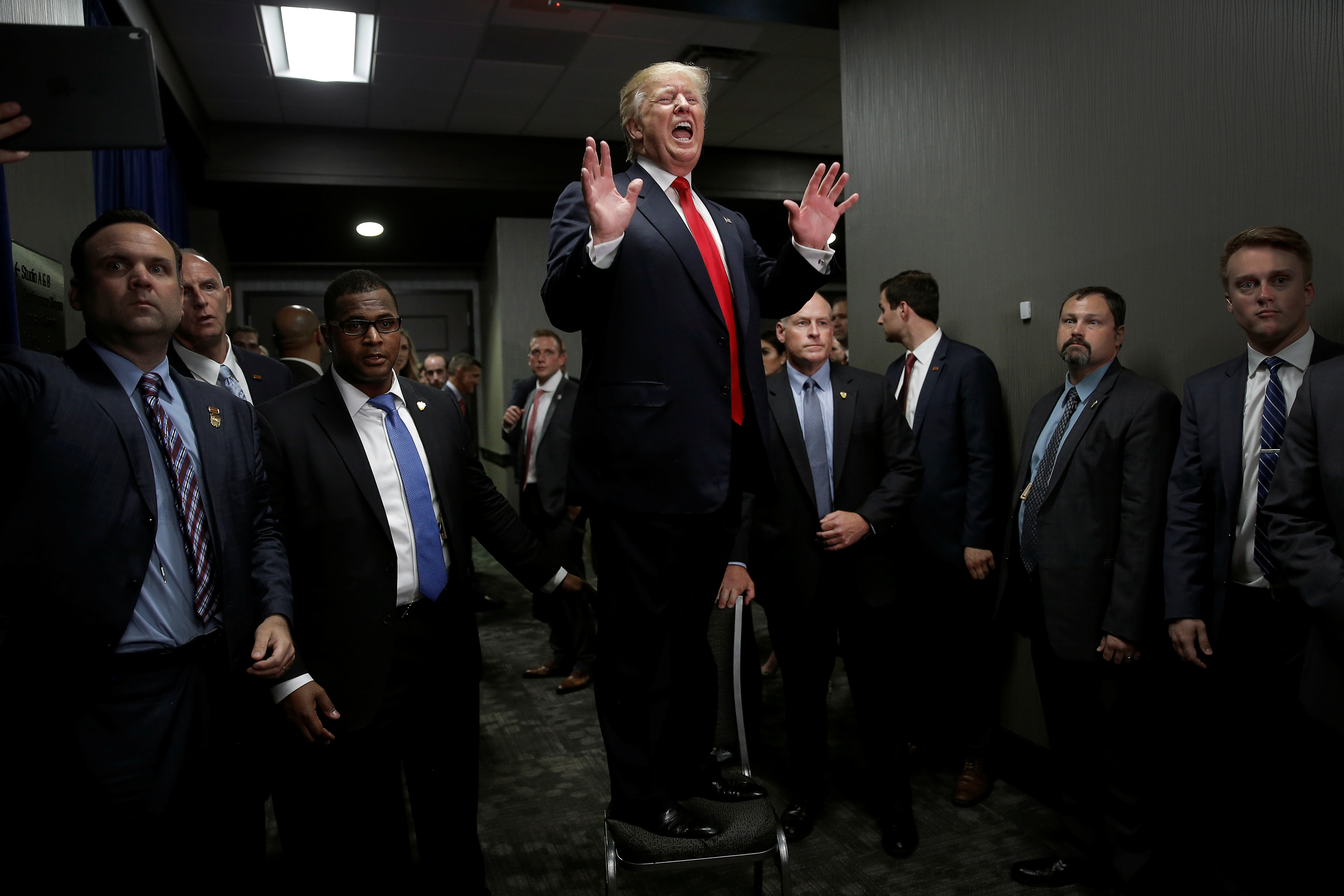Is President Trump about to unleash another financial crisis?
Who knows when the next crash will happen. But Trump is doing his level best to help it along.


A free daily email with the biggest news stories of the day – and the best features from TheWeek.com
You are now subscribed
Your newsletter sign-up was successful
President Trump's latest move in his bizarre combination of ideological conservatism and pseudo-populism is to deregulate Wall Street. As part of a broad attack on the Dodd-Frank financial reform, the administration is first taking aim at the "fiduciary rule," a regulation which forbids financial advisers from lying to their clients for their own profit. Populism!
Financial deregulation a mere eight years after the worst financial crisis in three generations is just the kind of thing we've come to expect from this omnishambles of an administration. Its most immediate effect will be to make it easier for Wall Street to further bleed the life from beleaguered American communities. But is also raises an important question: Are we about to experience another financial crisis?
Now, if there's anything the last year of history has shown us, it's that it is a mug's game to try to predict anything with precision, be it politics or finance. However, there are a few statements we can make about general economic structure, and future probabilities.
The Week
Escape your echo chamber. Get the facts behind the news, plus analysis from multiple perspectives.

Sign up for The Week's Free Newsletters
From our morning news briefing to a weekly Good News Newsletter, get the best of The Week delivered directly to your inbox.
From our morning news briefing to a weekly Good News Newsletter, get the best of The Week delivered directly to your inbox.
Number one is that while Dodd-Frank did seem to cut Wall Street down to size somewhat, it was by no means aggressive enough. Financial activity can do one of two things, mechanically speaking: Facilitate the movement of capital, or loot value from the broader economy. In the latter case, that can be done explicit fraud, as with Bernie Madoff, or it can be fraud done through normal contracts, as in the Abacus case.
Or even more broadly, the whole of Wall Street can be turned into a giant money vacuum. As economist J.W. Mason has demonstrated, finance in general has seen a major push over the last generation to transform into a tool of extracting wealth from the rest of the economy. The "shareholder value revolution" transformed corporations from entities that worked to preserve themselves to entities that existed only to kick money out to shareholders with share buybacks, dividends, and borrowing — even if it meant destroying themselves in the process. Finance today is over twice the fraction of of the economy that it was back in the 1950s, and wildly more profitable, but actually less efficient at basic financial tasks.
That in turn is part of a broader political effort by conservatives to funnel money upwards by cutting taxes on the rich, slashing social services, and smashing unions. American income inequality is just about as bad as it has ever been, and the political system is dominated by entrenched wealth. Dodd-Frank impaired Wall Street some, but it was nowhere near what needed to happen.
So, things are looking good for banks!
A free daily email with the biggest news stories of the day – and the best features from TheWeek.com
And yet... an extremely top-heavy income distribution is also fragile and prone to crisis. As John Kenneth Galbraith wrote about the pre-Great Depression boom, when inequality was similarly bad: "The economy was dependent on a high level of investment or a high level of luxury consumer spending or both. The rich cannot buy great quantities of bread." But luxury goods markets are unstable, and a modern economy is based on mass consumption. The most solid investments will always be in catering to the largest possible population. If the working and middle classes have little disposable income, there will be inexorable pressure for Wall Street to gin up new fake new investments through financial and corporate chicanery, as they did during the housing bubble.
Trump's planned deregulation will enable this sort of thing. The fiduciary rule and many other parts of Dodd-Frank, such as reserve requirements (limiting the amount banks are allowed to borrow for each dollar of capital), are supposed to constrain financial products and make the ones that do exist less risky. There is every reason to think that the moment the chains are taken off, the great swindle will begin anew — if it hasn't already started. As Matthew Stoller argues, the key factors enabling a crisis are "size, fragility, and leverage," all of which will get worse faster as deregulation takes hold. Indeed, even with Dodd-Frank the biggest banks are bigger now than they were before the crisis.
That is not to say that the next bubble will be as big as the last one, or that it will happen on any sort of particular timescale. A really spectacular bubble requires a certain willful blindness that seems nearly impossible so soon after the last crisis. And timing the collapse of even a very obvious bubble is tough — as Keynes famously said, "Markets can remain irrational a lot longer than you and I can remain solvent."
But on the other hand, financial markets are at record highs. House prices in some big cities are nearly as high as they were before the 2008 crisis. And the psychotic complexity of Wall Street makes it very hard to even figure out where danger might be lying.
If history is any guide, it's a certainty that we are in for it at some point in the future. And President Trump's deregulation will only accelerate the process.
Ryan Cooper is a national correspondent at TheWeek.com. His work has appeared in the Washington Monthly, The New Republic, and the Washington Post.
-
 Is the Gaza peace plan destined to fail?
Is the Gaza peace plan destined to fail?Today’s Big Question Since the ceasefire agreement in October, the situation in Gaza is still ‘precarious’, with the path to peace facing ‘many obstacles’
-
 Vietnam’s ‘balancing act’ with the US, China and Europe
Vietnam’s ‘balancing act’ with the US, China and EuropeIn the Spotlight Despite decades of ‘steadily improving relations’, Hanoi is still ‘deeply suspicious’ of the US as it tries to ‘diversify’ its options
-
 Best UK fashion exhibitions in 2026
Best UK fashion exhibitions in 2026The Week Recommends See much-loved and intriguing items from designers and style icons right where they belong: on display
-
 The billionaires’ wealth tax: a catastrophe for California?
The billionaires’ wealth tax: a catastrophe for California?Talking Point Peter Thiel and Larry Page preparing to change state residency
-
 Bari Weiss’ ‘60 Minutes’ scandal is about more than one report
Bari Weiss’ ‘60 Minutes’ scandal is about more than one reportIN THE SPOTLIGHT By blocking an approved segment on a controversial prison holding US deportees in El Salvador, the editor-in-chief of CBS News has become the main story
-
 Has Zohran Mamdani shown the Democrats how to win again?
Has Zohran Mamdani shown the Democrats how to win again?Today’s Big Question New York City mayoral election touted as victory for left-wing populists but moderate centrist wins elsewhere present more complex path for Democratic Party
-
 Millions turn out for anti-Trump ‘No Kings’ rallies
Millions turn out for anti-Trump ‘No Kings’ ralliesSpeed Read An estimated 7 million people participated, 2 million more than at the first ‘No Kings’ protest in June
-
 Ghislaine Maxwell: angling for a Trump pardon
Ghislaine Maxwell: angling for a Trump pardonTalking Point Convicted sex trafficker's testimony could shed new light on president's links to Jeffrey Epstein
-
 The last words and final moments of 40 presidents
The last words and final moments of 40 presidentsThe Explainer Some are eloquent quotes worthy of the holders of the highest office in the nation, and others... aren't
-
 The JFK files: the truth at last?
The JFK files: the truth at last?In The Spotlight More than 64,000 previously classified documents relating the 1963 assassination of John F. Kennedy have been released by the Trump administration
-
 'Seriously, not literally': how should the world take Donald Trump?
'Seriously, not literally': how should the world take Donald Trump?Today's big question White House rhetoric and reality look likely to become increasingly blurred
